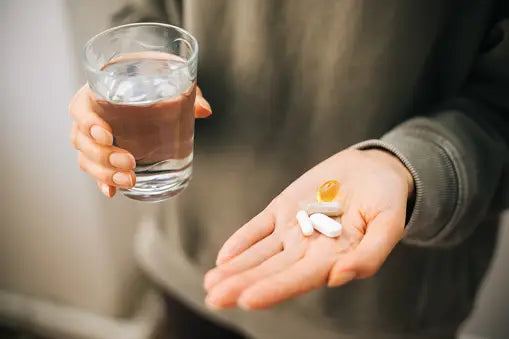

Creatine Monohydrate Results in Similar Increases in Strength as Creatine HCl
Table of Contents
| Creatine Monohydrate Results in Similar Increases in Strength as Creatine HCl |
by: Robbie Durand
Creatine monohydrate has become the most widely researched ergogenic aid to date, and the research is overwhelmingly clear that creatine not only increases muscle strength but now creatine does what no other supplement can do…creatine monohydrate lowers myostatin. In a study in the Journal of Molecular and Cellular Endocrinology, researchers examined how creatine impacted myostatin levels in resistance-trained men. In a double-blind design, 27 healthy male subjects were assigned to resistance training and creatine supplementation groups. Amazingly, the study found that creatine supplementation added to a resistance-training program amplifies the training-induced decrease in serum levels of myostatin, increasing the effects of exercise on muscle strength and mass. Other studies have reported that ingestion of creatine monohydrate enhances muscle IGF-1 responses as well in conjunction with increasing satellite cell activation.

Creatine Hydrocloride (CrHCl) is a new form of creatine that is supposed to be 41 times more soluble in water than creatine monohydrate. The authors then propose that greater solubility and permeability could decrease the amount of creatine needed to fill the muscle. That would mean more absorption, less creatine excretion, and less gastrointestinal discomfort. Many companies claim that creatine HCL results in greater increases in muscle strength than creatine monohydrate. A new study published in the Journal of Food and Nutrition Sciences reports that creatine HCL results in the same increases in muscle strength as creatine monohydrate.
Researchers from Brazil compared the effects of two different doses of creatine HCl (1.5 g and 5 grams of Creatine HCl) with creatine monohydrate (5 grams) on the strength and body composition of recreational weightlifters. All groups performed 4 weeks of strength training and they were asked to maintain 4 weeks without participating in any regular physical exercise before the start of the training program. The program was composed of four exercises of chest and back muscles, three to shoulder muscles, four to legs muscles, three to biceps and triceps, and two abdominal exercises. Subjects performed four sets of 10 to 12 reps (80% to 90% of 1 MR) of each exercise and the sets were executed until momentary exhaustion.
At the end of the study, there was no difference in strength between the creatine monohydrate group and the creatine HCL group, but the creatine HCL group did have greater improvements in body composition (% bodyfat decreased and increases in lean muscle mass). Before you run to the nearest store to buy creatine HCL expecting bigger arms, lets look at the study closely. On average, however, both groups gained almost the same amount of muscle and lost almost the same amount of fat, but the creatine HCL 1.5 grams and 5 grams lost 8% bodyfat whereas the monohydrate group lost 5%. Another big problem with the study is that they used skin folds for bodyfat testing which is notoriously off compared to DEXA testing which is the gold standard for measuring body composition. Skinfolds can be way off when it comes to determining body fat percentage in individuals. When it comes to tracking change over time in groups, then skinfolds do pretty well. However, errors for tracking change in individuals over time can be up to 3-5%. Based on this one study, it seems that creatine HCL can be used at lower doses than creatine monohydrate but the results are just the same. So, you can pick the right creatine for you but there is no superiority of creatine HCL over monohydrate. Creatine monohydrate has had over 1500 peer reviewed studies but its too early to establish the validity of creatine HCL until more long term studies are conducted.
de França, Elias, et al. “Creatine HCl and Creatine Monohydrate Improve Strength but Only Creatine HCl Induced Changes on Body Composition in Recreational Weightlifters.” Food and Nutrition Sciences 6.17 (2015): 1624.
Ostojic, S.M. and Ahmetovic, Z. (2008) Gastrointestinal Distress after Creatine Supplementation in Athletes: Are Side Effects Dose Dependent? Research in Sports Medicine, 16, 15-22.
Saremi A, Gharakhanloo R, Sharghi S, Gharaati MR, Larijani B, Omidfar K. Effects of oral creatine and resistance training on serum myostatin and GASP-1. Mol Cell Endocrinol, 2009 Dec 22.
Deldicque L, Louis M, Theisen D, Nielens H, Dehoux M, Thissen JP, Rennie MJ, Francaux M. Increased IGF mRNA in human skeletal muscle after creatine supplementation. Med Sci Sports Exerc, 2005 May;37(5):731.
Dash, A.K., Miller, D.W., Huai-Yan, H., Carnazzo, J. and Stout, J.R. (2001) Evaluation of Creatine Transport Using Caco-2 Monolayers as an in Vitro Model for Intestinal Absorption. Journal of Pharmaceutical Sciences, 90, 1593-1598.
Gufford, B.T., Sriraghavan, K., Miller, N.J., Miller, D.W., Gu, X., Vennerstrom, J.L. and Robinson, D. (2010) Physi- cochemical Characterization of Creatine N-Methylguanidinium Salts. Journal of Dietary Supplements, 7, 240-252.
Gufford, B.T., Ezell, E.L., Robinson, D.H., Miller, D.W., Miller, N.J., Gu, X. and Vennerstrom, J.L. (2013) Dependent Stability of Creatine Ethyl Ester: Relevance to Oral Absorption. Journal of Dietary Supplements, 10, 241-251.

















